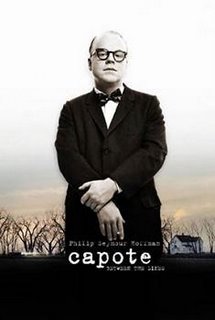 Last night I took myself to see Capote at Balwyn’s Palace Cinema*. Firstly, Philip Seymour Hoffman, as previously blogged, of whom I am a fan, was as good as any other Best Actor I have seen (that doesn’t mean he was the best ever only that he was good and that the others were good too). Not being familiar with Truman Capote, the person, it is hard to judge whether Hoffman ‘nailed’ the character he was playing but beyond the opening minutes when you first hear Capote’s voice and see his effete mannerisms, I fully believed the character and didn’t feel as though I was watching a caricature.
Last night I took myself to see Capote at Balwyn’s Palace Cinema*. Firstly, Philip Seymour Hoffman, as previously blogged, of whom I am a fan, was as good as any other Best Actor I have seen (that doesn’t mean he was the best ever only that he was good and that the others were good too). Not being familiar with Truman Capote, the person, it is hard to judge whether Hoffman ‘nailed’ the character he was playing but beyond the opening minutes when you first hear Capote’s voice and see his effete mannerisms, I fully believed the character and didn’t feel as though I was watching a caricature.Catherine Keener as Nelle Harper Lee (author of To Kill A Mocking Bird) was a good foil for Capote by seeing through his every motive and foible but still loving him as a friend, as good friends do.
Clifton Collins Jr as one of the two murderers on death row (as Perry Smith) plays an erudite, thoughtful and talented young man of whom you are not sure if he could be capable of such horrific crimes as he has been found guilty of. It is Capote’s idea to write a whole new style of novel, the “non-fiction novel” that contrasts the “safe, protected country the Clutters knew [the victims] and the rootless, amoral country inhabited by
their killers.” As Smith says during the film, “I thought Mr Cutter was a very nice gentleman. I thought so right up to the moment that I cut his throat”.
The story is Capote’s however and it is told from his point of view. Capote was narcissistic and self-absorbed who manipulated those around him to get what he wanted (“Sometimes when I think how good [my book] could be, I can hardly breathe”). His use and misuse of Perry Smith is a case in point. Capote paid for legal counsel for the killers to obtain for them a stay of execution so that he had more time to write about the case and talk to Smith about his side of the story. As the case dragged on however Capote became more and more despondent. He couldn’t finish his novel until their case was resolved. When he cut his funding to their lawyers their fate was sealed and they were executed by hanging.
Capote shed tears for these men whom he had gotten to know well. I was unsure whether he was shedding tears for them and their imminent death or whether he was shedding tears for himself. You could see his health decline over the stress and delay of being unable to finish his novel. In the end it was a mixture of both and his guilt that ultimately destroyed him : he did not finish another novel after In Cold Blood despite living for another 20 years. One quote that closes out the movie (from one of his unfinished later novels) says in essence that getting an answer to prayer (in this context, that the accused die so that he could finish his novel satisfactorily) can be as damning as unanswered prayers.
The movie is a character study and Hoffman inhabits this character always knowing where his limits are and how he can play off other people. It is not until quite late in the film where you relive the killings (both the murders {of which there are four} and the hangings {of which there are two}) and they are a shock to the system. Suddenly the screen changes momentarily from the drab greys and browns of 1960’s rural America to splashes of blood red and the sound effects blast at us, shaking us from our indecision.
We are fascinated by Truman Capote in this picture although we do not sympathise with him. There are no tears shed by us at his funeral although we continue to linger on his style and charm and wit.

2 comments:
Given the superlative reviews of Capote, I was wondering perchance if
you had seen the latest low budget, angsty art-house release "The Pink
Panther" with a sensational new comedian called Steve Martin. Surely one
of the most original movies in quite some time.
-F.N.
Thank-you FN for your insight. I think it is sufficient to know that when EVEN Margaret "I simply love it" of 'David and Margaret' fame gives it one, single, solitary star (*) then you get a pretty fair idea of how it is going.
Post a Comment